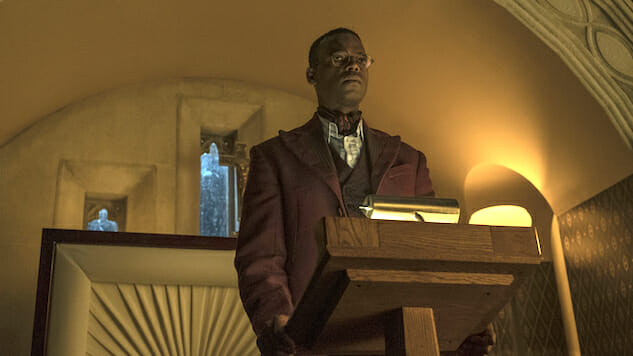“The Ways of the Dead” Makes American Gods Feel More Alive
(Episode 2.05)
Photo: Starz
There are a lot of ways to feel deeply alive. It can come in the rush after surviving danger, during steamy sex, or after being hit with massive grief. Each of these scenarios happens in this week’s American Gods, reminding each character that there’s more than to living than the war immediately in front of them.
And thank god(s). “The Ways of the Dead” takes a break from gathering recruits and uses all of the series’ storytelling tools: flashbacks, conversation (instead of exposition), haunting music, sharp editing that keeps things moving, and even actual ghost stories. The result is much more interesting than “The Greatest Story Ever Told.”
The tale of Will James (Warren Belle) reminds me how much American Gods depends on looking at the past as well as the future. Having Emily Browning do double duty again as Laura Moon and the white woman in Will James’ story works well. Laura doesn’t need anyone defending her, and women in the past didn’t need defending against a false threat with hidden racist intentions, designed to trap and hurt black men. Using Ricky Whittle as a momentary stand in for Will James reinforces this theme of tying the events of the past to those living today.
The repetition of past and future is also reflected in the images of the young black man in Cairo and Nancy’s (Orlando Jones) feet walking toward each other on the street corner—with Nancy heading to the future and the other man heading to a repeat of the past, falling into an echo of Will James’ story and culminating in seeing his head aflame on a stick. These visual echoes appear throughout “The Ways of the Dead.” For instance, Shadow looks like he borrows Ibis’ (Demore Barnes) clothes, which fit right into a scene of Will James’ past that Shadow walks into. Past and present continually fade into each other, and people are unable to escape it.
-

-

-

-

-

-

-

-

-

-

-

-

-

-

-

-

-

-

-

-

-

-

-

-

-

-

-

-

-

-

-

-

-

-

-

-

-

-

-

-








































